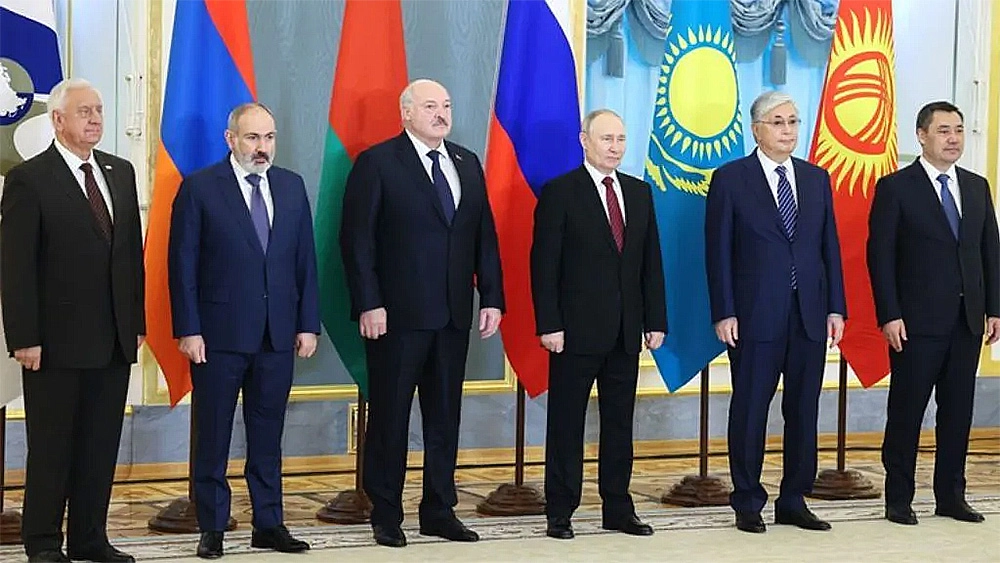2024/5/21 Eurasian Economic Union holds Annual heads of state meetings: Discussions and developments
The heads of state of the Eurasian Economic Union (EAEU) countries met in Moscow in May 2024 to discuss the ten-year progress since the bloc was formed and make plans for future development. The event was attended by the five heads of state from Armenia, (Prime Minister Nikolai Pashinyan) Belarus (President Alexander Lukashenko), Kazakhstan, (President Kassym-Zhomart Tokayev), Kyrgyzstan (President Sadyr Zhaparov) and Russia, (Vladimir Putin) while Cuban President Miguel Mario Diaz-Kanel Bermudez and the President of Uzbekistan, Shavkat Mirziyoev were in attendance as observers.
The Presidents of Tajikistan (Emomali Rahmon) and Turkmenistan (Serdar Berdimuhamedow) attended a later EAEU dinner.
Russian President Putin applauded the bloc’s development, stating the EAEU has performed well over the past decade and established itself “as an independent and self-sufficient center of the emerging multipolar world.” The EAEU strongly adheres to its “main principles of integration cooperation,” namely “equality, mutual benefit, respect for and consideration of each other’s interests,” Putin noted.
“The economic indicators speak for themselves: according to available estimates, over the ten years the joint GDP of the EAEU countries went from US$1.6 trillion to US$2.5 trillion. Trade with third countries grew by 60% from US$579 billion to US$923 billion, while the volume of mutual trade almost doubled: from US$45 billion to US$89 billion, with over 90% of transactions already made in national currencies,” Putin stated, noting that positive macroeconomic trends have been observed within the EAEU this year as well. These figures suggest an annual, sustained EAEU growth rate of about 6-7% over the past ten years.
The EAEU has proven to be beneficial not only to its member states, but to the broader Eurasian region, the president stated. The union “helps ensure stable and sustainable development both of the five member countries and the Eurasian region as a whole, and results in improving the quality of life and wellbeing of our people,” he said.
The EAEU is effectively a successor to the Eurasian Economic Community, a now-defunct group that existed between 2000 and 2014 but was dissolved soon after the EAEU treaty was signed. It fills a geographic space between Eastern Europe and Western China.
Russian Deputy Prime Minister Aleksey Overchuk said that trade turnover within the EAEU could exceed US$100 billion during 2024. “This, in fact, is evident from the statistics. Last year, we reached a record turnover at US$84 billion, this year we also have good growth. The year, of course, is not over yet, but there are some forecasts that we will exceed US$100 billion.”
According to Overchuk, the trade growth stems from the fact that EAEU members have succeeded in creating favorable conditions for businesses to interact within the bloc so that “business representatives within our five countries believe that it is most convenient for them to work with each other.”
A great deal of Russian consumer products, including fruits and vegetables that it previously bought from European producers are now sourced from EAEU members. The EAEU itself has achieved food security and is not dependent upon external suppliers.
Russia has stepped up efforts to expand trade and other facets of economic cooperation with allied nations as it faces Western sanctions. The country has also been actively switching trade from dollars and euros to national currencies. According to recent estimates, the share of national and other ‘friendly’ currencies in Moscow’s trade with EAEU reached 76% in 2022 and is expected to grow to 90% this year.
Concerning Cuba, Putin said that he expected that Cuba’s participation in the EAEU will be useful for all parties. At a meeting with Cuban President Miguel Diaz-Canel, Putin drew attention to the participation of the Cuban leader in the EAEU summit in Moscow on May 8, noting that this association is “one of the most efficient in the post-Soviet space. Cuba is taking part in it as an observer, and I hope that it will have results.” Putin said. Cuba-EAEU trade has been targeted for growth although it is apparently too early for a Free Trade Agreement to be put into place.
There is to be an EAEU-Mongolia FTA however, with the EAEU bloc voting to support such an agreement. In addition, the participants adopted a draft protocol on electronic exchange of information between the EAEU and Vietnam under the electronic system for certification and verification of origin of goods, within the context of the EAEU-Vietnam FTA.
Belarussian President Alexander Lukashenko meanwhile talked up the possibility of further trade development and especially between the EAEU and Africa. He said that “It is important to systematize the process of establishing partner relations between the EAEU and third countries, and in our view, this needs to be systematized. In current geo-economic conditions, it should be clearly determined with what countries in what sequence and within what kind of timeframe a free trade zone will be formed, and with what potential partners there may only be interaction within the framework of appropriate memorandums.”
This indicates Lukashenko envisages a ‘two-tier’ trade agreement approach, with Tier One being full FTA, and Tier Two trade agreements on a G2G memorandum basis.
Lukashenko went on to recall the signing of a full-scale trade agreement with Iran. The process of strengthening mutually beneficial cooperation in the format of the Five with much-promising and friendly Asian nations, including India, Indonesia, and the UAE is also underway, he said.
The Belarusian president also noted that the EAEU has by now paid little attention to dialogue at the EAEU level with the African Continent. “Africa needs a broad list of our products, works, services and technologies. Africa, as well as Latin America, is fed up with colonialism from certain leading nations. And this is the point when we should come to Africa.”
Parallel participation by EAEU countries and their partners within the CIS in the Shanghai Cooperation Organization and BRICS also opens up huge benefits, he said.







